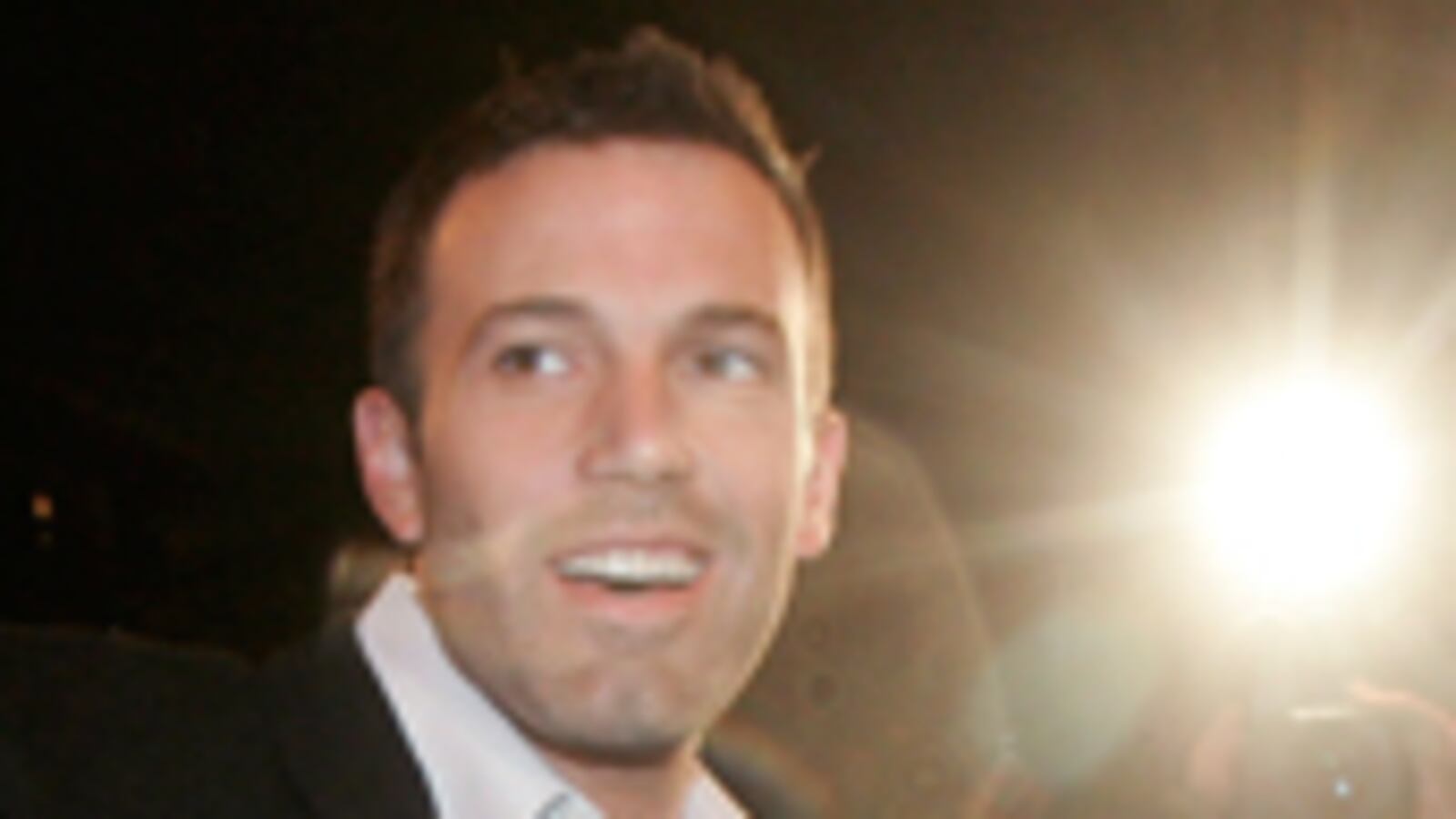
At a press junket here at the Toronto International Film Festival for The Town, Ben Affleck’s new crime drama that opens in theaters Friday, a journalist stammered through a question about Affleck’s slightly altered appearance, when the star cut him off.
“You’re asking about the gray hair, aren’t you?” he said, raising his eyebrows and cracking the wry smile that became famous with his 1997 Oscar-winning film, Good Will Hunting, which he starred in and co-wrote with best buddy, Matt Damon.
Dressed in a sharp gray suit, with a thin shadow of scruff carpeting his prominent chin, Affleck copped to the fact that, “I have a little bit of gray in my hair, yes,” and that, yes, he’s been resorting to the bottle.
“This is the movie I wanted to make,” says Ben Affleck. “And there’s some comfort in that. Succeed or fail, knowing that it was my own work and my own direction that I wanted to go in, and this is sort of who I am as a creative person.”
“It’s present,” he said, shrugging. “I acknowledge it.”
The gray is but one sign of the dramatic reboot of Ben Affleck, whom America first got to know as the fist-pumping frat boy of Matt-n-Ben fame. He went from accepting a screenwriting Oscar at age 25 (for Good Will Hunting) to starring in a string of high-grossing but uninspired action films, including two Michael Bay mega-spectacles, Armageddon and Pearl Harbor. Then, in 2003, almost overnight he went from highly paid frontman to PR disaster, thanks to a TMI romance with Jennifer Lopez, with whom he co-starred in one of the decade’s most embarrassing flops, Gigli.
As far as Hollywood was concerned, that was that. His career as a big-budget, A-list star was, in short order, over. Soon enough, even the tabloids were ignoring Big Ben.
Half a decade later, against the odds, Ben is back. And at 38, he is not only starring in, but directing some of the most interesting films coming out this year.
The “new” Ben is on full display here in Toronto, where, despite his youthful good looks—and chemically enhanced hair—he sat like an elder statesman among fellow The Town co-stars Jeremy Renner, Rebecca Hall, and Jon Hamm, thoughtfully answering questions and exuding a calm confidence, which, in a later interview, he attributed to his marriage to Jennifer Garner and being a father.
Ben 2.0 is also very much a product of the decisions he’s been making as a filmmaker. If his first outing as a writer-director, Gone Baby Gone, which starred his younger brother Casey, won him respect, if not box-office riches (the film grossed just $20 million), The Town, based on the Chuck Hogan novel Prince of Thieves, is poised to do much more.
A heist film in the vein of classics like Rafifi and more contemporary films such as Heat, The Town combines popcorn commerciality with a sophisticated depth, thanks to a sharp screenplay (which Affleck co-wrote) and some outstanding performances—most notably Affleck and Renner. The two play best friends and partners in a blue-collar Boston crime ring, who clash when Affleck’s character, Doug MacRay, wants out. Affleck also turns in a moving performance in the upcoming The Company Men, a somber portrait of the recession and how it affects a group of white-collar executives, played by Affleck, Chris Cooper, and Tommy Lee Jones.
In an interview the day after the junket for The Town, Affleck resisted being neatly boxed into the comeback story narrative.
“It’s a little bit more complicated than that in my case,” he said, sitting on a sofa, a long, jean-clad leg stretched out on a coffee table. “Because my life has had a lot of different twists and a lot of different ways in which sometimes I’ve tried to do things and worked really hard, and it hasn’t worked. And sometimes I’ve worked equally hard, and it has.
“If anything, it’s kind of a drift, a natural progression over the last five, six years. Maybe it’s being more mature, or just being interested in different kinds of movies—making Hollywoodland and making Gone, Baby, Gone, and making State of Play, and this movie.”
Beyond his interest in more contemplative films, he said he has taken a greater interest in the ownership of his art.
“When you write and direct and act in a movie, you’ve got to take responsibility,” he continued. “You know—this is it,” he said. “This is the movie I wanted to make. And there’s some comfort in that. Succeed or fail, knowing that it was my own work and my own direction that I wanted to go in, and this is sort of who I am as a creative person.”
The Town, he said, “is my effort at trying to make that work.”
Like Good Will Hunting and Gone Baby Gone, the film is set in Boston, Affleck’s hometown and muse, in the way that New York is to Scorsese and Baltimore is to John Waters. And, like those filmmakers, though in a far more unlikely route, Affleck has emerged as his city’s most serious chronicler, exploring its depths, contradictions, and secrets.
“I was nervous about directing the movie because I thought it would pigeon-hole me as Boston Crime Johnny, but I wanted to play this part,” he said of MacRay, a brooding ex-hockey player who’s torn between the life of crime he knows and the life he covets when he falls in love with Claire, a schoolteacher played by Hall.
Like Affleck’s role in The Company Men, in which he plays a laid-off executive who has to face the humiliation of starting over mid-career, it’s an intense and interesting character that suggests he’s thinking more deliberately about film choice—something that couldn’t be said of him in the Gigli days.
That history still haunts, but half a decade later, he has found a distance and humor about it. At the junket, when asked why he didn’t cast Garner in The Town, he paused and then said, “Something tells me, people don’t want to see real-life couples in movies.”
The crowd erupted in laughter.
Something else that he can’t seem to escape these days is the notoriety his brother Casey is attracting over the sexual harassment lawsuits filed against him by women who worked on Casey’s new documentary about Joaquin Phoenix, I’m Still Here.
When Affleck was asked about the controversy at the junket, he diplomatically said: “My brother is a really gifted guy. He and I are about to write a movie together, I’m told. So look for more gray hair.”
Nicole LaPorte is the senior West Coast reporter for The Daily Beast and the author of The Men Who Would Be King: An Almost Epic Tale of Moguls, Movies, and a Company Called DreamWorks.





